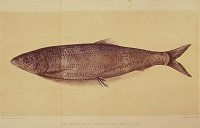The Herring
The herring is an oily fish. Economically, it has been the most important fish and one of the earth's most used marine resources. Herring has been very important to the Scottish diet. It provided a cheap, plentiful and nutritious source of food. They have been caught off the cost of Scotland for hundreds of years.
The herring is a pelagic species and is related to the mackerel, pilchard and sprat. Pelagic is used to describe fish which live in the upper layers of the open sea. Herring is the common name for Clupea harengus. These fish swim near the surface of the water in huge shoals rising to the surface at dusk to feed on plankton.

The herring has a deeply forked tail, a short dorsal fin in the middle of its upper body, and an anal fin below. It has a silvery belly and a blue-green back, which allows it to merge with the colour of the water when viewed from above.
As spawning approaches, the fish gather in larger shoals. Each shoal is made up of fish of largely the same age and characteristics. They spawn in shallow bays and deposit their eggs on the seabed. Each herring lays at least 10 000 eggs and the young are often called whitebait. When mature, herring are about 30 cm long. It is the Atlantic herring that is found in the North Sea and it matures at three to four years of age and can live to ten or eleven years. The marine food chain plays an important part in herring distribution.
There are several different herring stocks in Scottish and British waters. They all follow an annual migration cycle from the feeding grounds to spawning grounds and back. The fish never remaining in any one place for more than a few days and the pattern of migration is liable to change without warning. These cycles vary to include spring, summer and autumn spawners.
It is during spawning time that the fish are usually taken. This is why herring can be caught in different places at different times of the year, and it helps us to understand how the seasonal fisheries evolved.